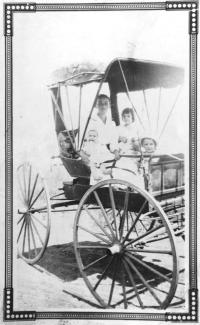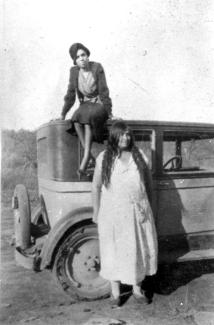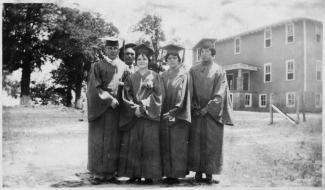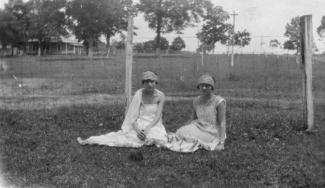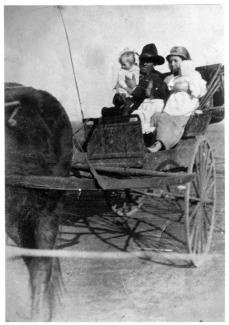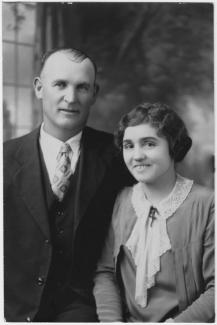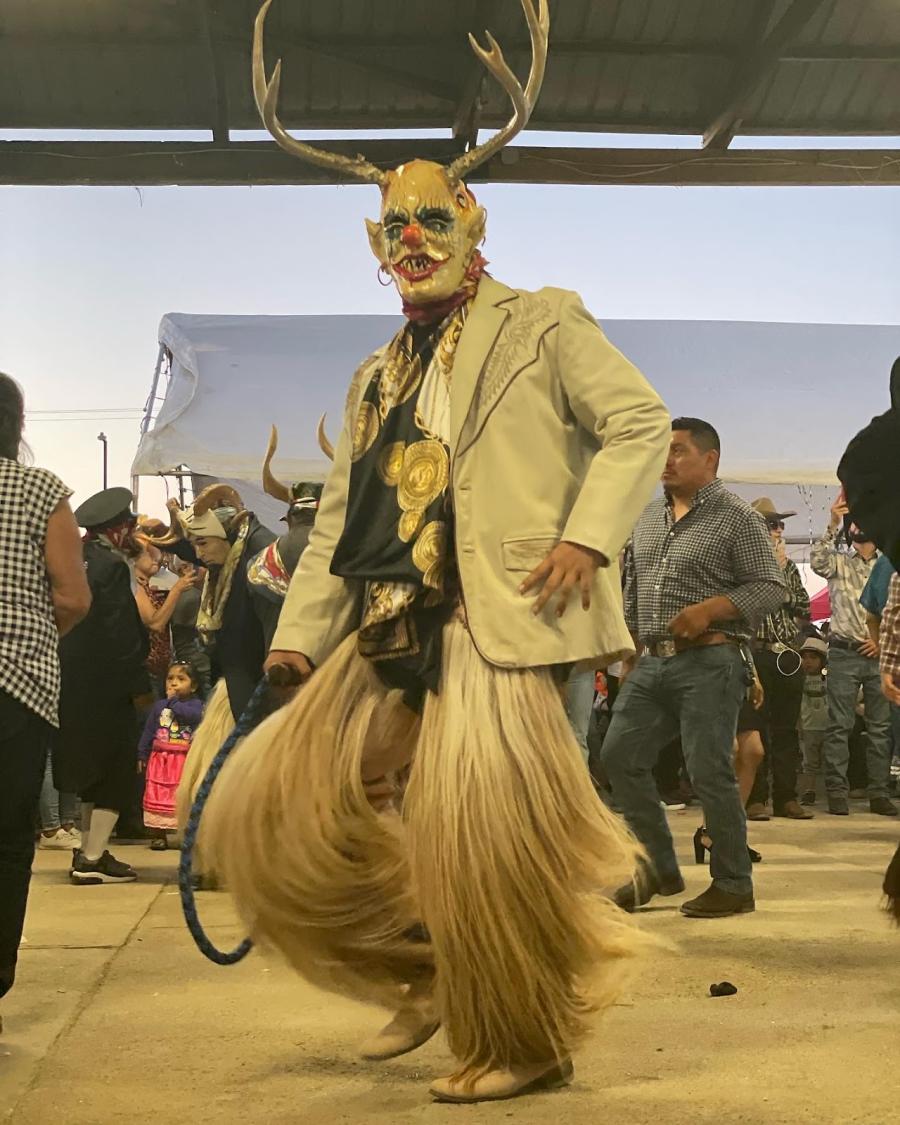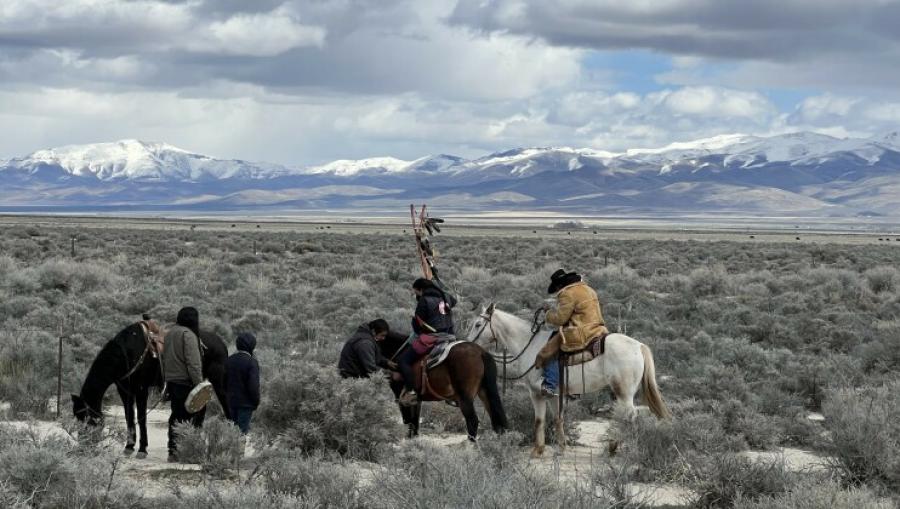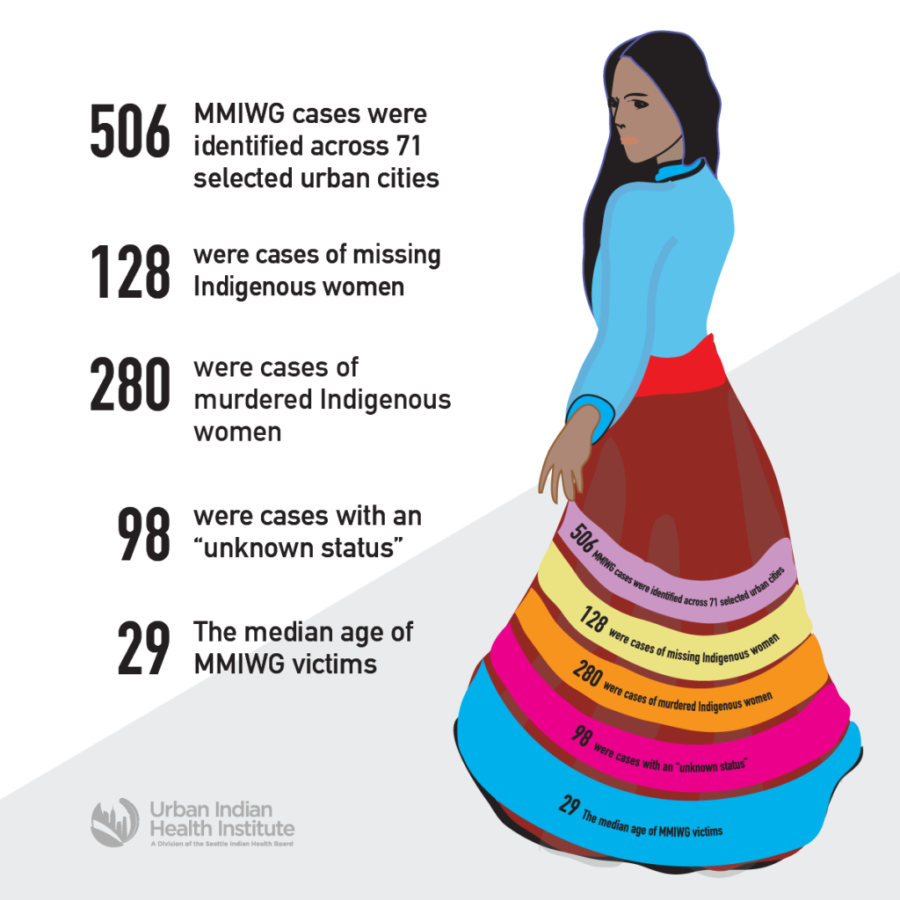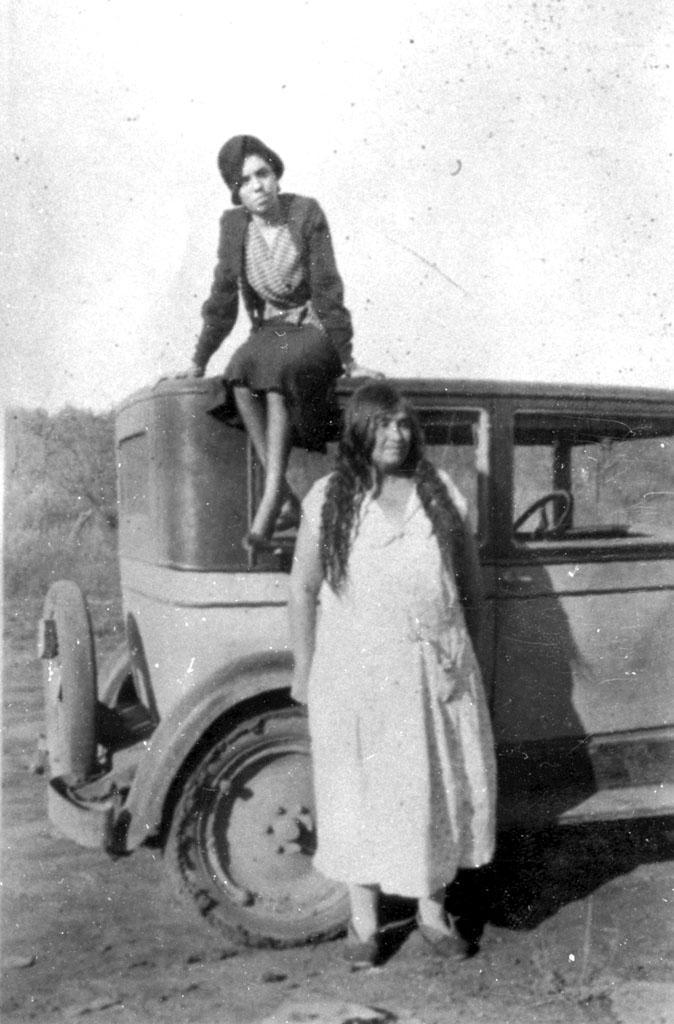
By Terri M. Baker
Sharp edged memories of hard times, heartbreaking landscapes, narrow escapes, poignant tenderness, and breathtaking stories profoundly mark Oklahoma as Indian country. "We are Choctaw," Mother would begin her stories. "The big girls at Goodland said that we came out from a mound and rested on its sides until we dried, but some of us burned darker than others from the sun. The Choctaw walked from Mississippi to southeastern Oklahoma, a long way. Our family lived in Bokchito and in the Caddo area."
"Great Grandmother Lena," Mother told us, "came from Bennington to live with Old Man Hull. Lena’s family came from old Sixtowns in Mississippi. We are descended from Pushmataha, a great man. Your cousin Push is named for him. Push's sister is named Pocahontas, and she was very beautiful. Pocahontas was our ancestor. You remember Pokey, the woman with the long black hair that she wears pulled straight back and in a bun. She always wears dangling earrings of silver and turquoise."
Mother's stories would begin in reality and spin off somewhere into legend. Thus I grew up believing that Pocahontas was a Choctaw, a not too distant relative whose descendant (her granddaughter?) was called Pokey. I never quite understood the specifics (they changed often), but came to know that I too was beautiful and strong and that I belonged to a group of people significant in the history of the United States and of the world.
Winter evenings my older sister Nikita (Mother’s version of Nitekechi—an early nineteenth century Choctaw leader) and I sat in the living room before the open gas flames of the stove listening to Mother's stories as her laughter pulsated below the tune of her words.
Pocahontas and Pushmataha, mules, corn, cotton, bootleg whiskey (called wildcat) danced in my head, forming the ground of my being in the early 1950s in Bryan County.
My memories of Papa Hull, Mother’s father, focus on a telephone voice which spoke only on December 24.
The phone would ring, my mother and father would exchange looks, and my mother would say "That's Papa." Then she would disappear into the den where our one telephone sat. She stayed in there alone for some time to speak to her father who had abandoned her when she was three years old.
Occasionally my sister and I would be summoned to speak to Papa Hull, whose words were difficult to understand. You see, he could call only when he was drunk.
Papa Hull and Jesus came on Christmas Eve. That is balance of a kind.
When I was about eight years old, my mother and father left us with Daddy's sister and took the only vacation I can remember their ever taking. They drove from Oklahoma to Washington State in search of Papa Hull. Mother had some questions to put to him. Daddy says that Papa Hull had gone back to the blanket. "Back to the blanket" -- a phrase used years ago to mean an Indian who had taken up old ways once again -- or maybe for the first time. Mother and Daddy found him living on the top of some mountain at the end of a narrow, twisting, dirt road which had been hard to find.
People who go "back to the blanket" always seem to live on a narrow, twisting, dirt road which is hard to find.
Mother finally asked him why he left his wife and children and never came back. Papa Hull said that he had been ashamed. I guess so.
Mother accepted that, and never saw him again, although she always encouraged us to think kindly of him. I think he lost his way. I also think his journey to the land of the spirits will take a loooong time.
The Choctaws, you see, the old Choctaws, believed that after death a soul journeys on a log bridge to the spirit land -- Choctaw heaven complete with deer, corn, good health and family. The log has been peeled, so it is slippery. From the side of the afterlife land, rocks may be hurled at crossing spirits of the dead by those wronged during the person's life.
Any wrong may be a rock and may cause the spirit to loose balance and fall into the abyss where the spirit will wander alone for eternity.
Sometimes I send good thoughts to Papa Hull, but I know that his wife, my Grandmother Maud, would never throw even the smallest stone, and I also trust that my mother will not cause any problems for Papa Hull. He already has enough problems on that log bridge.
Papa Hull, my mother's father was half Choctaw, half Irish, born in the late 1890s before statehood, during the time of the Dawes Commission enrollment. A portrait and a snapshot of Papa Hull’s mother Lena looked out from my mother's hall portrait gallery. The two images picture different women. One image is a white woman. The other image is an Indian woman. But both images are of the same person.
The professional hand-colored portrait, taken in what may have been in Lena's twenties or early 30s, shows a women formally dressed in the late years of the nineteenth century--high collar, upswept hair style, fashionable tilted hat. Her face is serene but sad. You know that she wore a corset because that was proper for women of her station in life. Her posture is straight.
The Kodak snapshot Lena has fallen on hard times. She stands beside a high framed model-T, corsetless, waist length black hair blowing gently in the dust of East Texas during the 1930s. She is what the 1950 Hollywood movies might have labeled a squaw. Her granddaughter Beatrice—my mother’s sister--sits on top of the Model-T. Beatrice is rakish, modern, her ankles crossed below her short skirt, her hair "bobbed" under her tilted, cloche hat. Neither woman is smiling. The time is the Great Depression after all.
Great Grandmother Lena was born during the eighteen hundreds to Choctaw parents in Indian Territory. Her parents descended from those Choctaws who had been among the first of the Five Civilized tribes "removed" to Indian Territory along the Trail of Tears in the early 1830s.
During their marriage, Lena and Old Man Hull created what became a powerful and respected family in Bryan County. Old Man Hull was a white man age about forty who had come to Choctaw Nation in the late 1800s. In Indian Territory he negotiated a marriage with a Choctaw daughter, my great grandmother Lena, age sixteen. Old Man Hull paid the Choctaw family a bride price of a wagon load of corn and two mules.
However, Grandmother Lena had already picked out someone she wanted to marry. That family still lives in Durant. Still, Grandmother Lena's Choctaw family believed that the marriage to Old Man Hull was the best thing for their daughter. Old Man Hull could pay the bride price, which was high and that meant that he could take care of her in uncertain and often violent times. These were Oklahoma’s outlaw years.
So being a good Choctaw daughter, Lena followed the wishes of her parents. Once married, Great Grandmother Lena told Old Man Hull that she would have his children and raise them to adulthood, but that when she had done that she would leave him. The bargain was made.
When Lena's children were grown, she left Old Man Hull to his ranching and moved to Bokchito into a fine house which Old Man Hull provided her. Lena was the first person in Bokchito to own a car and drove it with great panache.
When they were old enough, the daughters of Old Man Hull and Lena went to school in Durant at the Oklahoma Presbyterian College for Women. That college is now the site of the headquarters of the Choctaw Nation of Oklahoma. I attended kindergarten there in the 1950s.
My grandfather Leif, the son of Old Man Hull and Lena, drank bootleg whiskey, raced flashy horses, carried wicked looking guns, courted pretty girls and generally charmed his father blind.
Then Leif met Maud, my grandmother, the daughter of tenant farmers. Young Maud was gentle, beautiful, appeared fragile and for a while tamed Leif's wildness. Because Maud's Cherokee mother and white father disapproved of the romance, as did Lena and Old Man Hull, Maud and Leif eloped romantically in a horse-drawn buggy and then in the next few years produced three children--Lodie, Beatrice and Geraldine. Geraldine, the youngest, is my mother.
Mother Maud lost the appeal of Romantic, girlish Maud. When Baby Geraldine was three years old, Papa Hull fell "in love" with another woman--a dressmaker whose family also still lives in Durant--mortgaged his Indian allotment to the bank (a common practice), and along with the dressmaker and the money left town.
Maud was left with three young children, a lien on the property which she had no way of paying, no money, no out of the home job skills, and two alienated families. For the next three years, Maud worked for her Old Man Hull--cooking for the ranch hands, washing, cleaning. Then when Geraldine reached the age of six, Maud enrolled all three children in Goodland Indian Orphanage for an education. Goodland was a mission boarding school run by the Presbyterians.
My mother, along with her brother and sister, entered Goodland in 1922 and stayed there for the next seven years. The seventh year Geraldine stayed alone at Goodland.
Because some of Mother’s Goodland friends lived in Durant, as a child I assumed that just about everybody was poor and went to Indian boarding school. Mother's Goodland roommate was Frankie Franklin, the secretary of the town’s junior high school, Mother’s Goodland teacher Jimmie Belvin was Principal Chief of the Choctaws from 1948 throughout my childhood, my seventh grade civics teacher was Choctaw, the father of one of the high school football heroes was Mother’s Goodland friend. Mattie who came to visit us at Christmas had been with my mother at Goodland. To me, Choctaws were not a minority people. We were just people. Mattie helped us celebrate and sheltered me when as a young adult I moved to Denver. And Mother’s Goodland friends helped Mother bury her dead showing up quietly at funerals.
Cherries in wildcat is a mix like life. The cherries temper the rawness of the alcohol.
More than thirty years ago when I took my husband (a white Florida boy in for a nuanced life) to meet my family at Christmas, I cautioned him not to eat any pale cherries that anybody offered him at the Christmas Eve party. You see, our family Christmas drink was Wildcat, sweetened with maraschino cherries which bleached to a pale pink in the pure alcohol. He ignored my advice, ate the offered alcoholic cherry and was immediately admitted into the family as a man with prospects and "get up and go."
Because of Goodland, the cherries in the Wildcat, always serve me as a metaphor for my mother's life.
She said that the first year at the boarding school, "I cried every night, I guess." Then she would say that she cried her last semester when she was told that she was to live in Durant again with her mother and new stepfather. She didn’t want to leave her friends who, indeed, formed an extended family throughout her life.
Once when Mother described a truly dangerous sounding game that involved riding a young sapling as it whipped back and forth, I asked what they did at Goodland if the children got hurt or sick. Mother answered shortly, "You didn't get sick or hurt. If you did, they'd take you away, and you didn't come back."
During the 1920s, the health care facility for the Goodland children was the T.B. sanitarium at Talihina.
Later the Choctaws bought that sanitarium, and in the 1990s my mother served on the Choctaw hospital board after the Choctaws began to operate it as an Indian Health Service hospital. She confided that walking into the hospital the first few times gave her a funny feeling and she cried. Mother always held in her heart the lost children from Goodland, her classmates, and devoted her last years to the hospital. Near the end of her life when Mother still served on the hospital board, the Choctaws completed a new 27 million dollar, debt free hospital in Talihina using our gaming money primarily.
God bless Bingo! Cherries in Wildcat.
Oklahoma’s American Indian family life is full of stuff like this. So much has happened here, so much sub-strata detail, so much that doesn't make the headlines. Oklahomans’ understanding of our history and culture is selective, layered, talked of in whispers, and sometimes requires a whiskey drink. But the importance lies in knowing who we are, peeling back the layers.
To my way of thinking, Oklahoma—Indian country--is a rich place to be, a good place to grow if you can take the aggravation, the moments sometimes sharp and painful. It's not for everybody, of course, but if you like rich living, this is the place.
--Terri M. Baker (Choctaw) is a retired professor. Terri worked at Northeastern State University and chaired the department that houses the Cherokee Language Degree Program and the Cherokee Cultural Studies. Terri taught Native American literature in the Languages and Literature Department and in the American Indian Studies Program.
